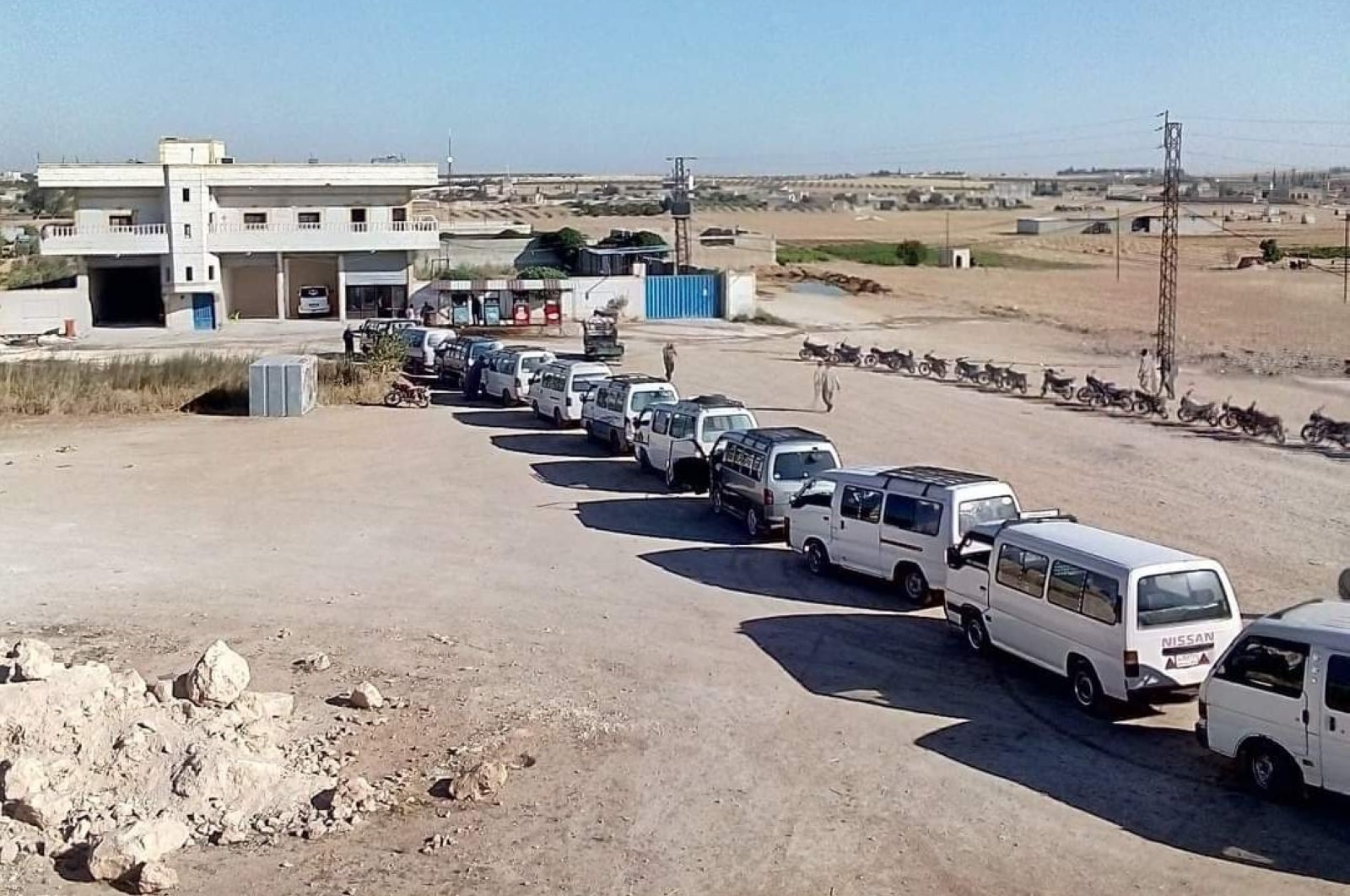
The Syrian offshoot of the PKK terrorist organization, the YPG, has limited local people's access to fuel in Manbij, northern Syria due to their refusal to join the group, a report said Monday.
The YPG/PKK controls Manbij, where 99% of the population is made up of Arabs, and has been forcing locals to take up arms and fight for the terrorist group through so-called "compulsory military service.” The terrorists decided to restrict civilians’ access to fuel after they rejected the group's demands, Anadolu Agency (AA) reported.
Although there are a number of petrol stations across the district, the YPG/PKK only allows a single station to sell fuel.
The terrorists have put restrictions on gas, allowing vehicle owners to purchase 40 liters (10.6 gallons) of fuel every 10 days between 9 a.m. to 3 p.m., causing queues of hundreds of vehicles lining up at the station.
Individuals who are unable to buy gas from the designated station due to the long lines usually buy it from the black market for twice the price, at around $2.5 dollars.
Manbij resident Muhammed Abu Ali, one of the people waiting in line to buy gas, told AA that the fuel crisis is not due to a lack of fuel, but rather the lack of stations distributing it.
"There are more than 150 vehicles waiting in the line up ahead of me,” Ali said.
The Manbij resident said that the 40-liter restriction is also quite challenging as it is simply not enough.
Complaining about the YPG/PKK’s single-station policy, another Manbij resident, Abu Yusuf, said that it has become a huge burden on the people."We come here at 5 a.m. to line up, but the owners of the gas station close it down around 2-3 p.m. and leave. We come the next day but they tell us that they have no gas left after filling up some tanks,” he said.
He explained that they used to be allowed to buy 40 liters of gas once a week, but the YPG/PKK has increased the period to 10 days.
Another resident, Abu Hasan, noted that the station owners have been exploiting the situation and the YPG/PKK fails to take action to help.
Last year, Manbij locals poured out into the streets for protests amid the YPG’s price hikes.
Northeastern Syria is the center of what remains of Syria’s oil industry. It is in shambles but remains one of the main sources of revenues for the YPG-led so-called autonomous administration there. The region is controlled by the YPG, which Turkey designates as a terrorist group.
About 70% of Syria's oil resources lie within the territories currently occupied by the YPG, with the support of the United States. The terrorist organization holds the eastern part of Deir el-Zour province, located near the Iraqi border, which is one of Syria's largest energy sources.
There are 11 large oil fields on the eastern side of the Euphrates, which cuts the province into two. These oil fields make up around one-third of the energy sources in Syria.
YPG terrorists control some of Syria's largest gas and oil fields but are not producing enough oil and gas to meet demand. Having seized most of Syria's energy resources, the YPG terrorist group has also forcibly and disproportionately raised fuel prices.
The YPG imposes "compulsory military service" on women and men born between 1990 and 2003. The terrorist organization forcibly recruits Arab children and youth in areas that include Manbij, Ain al-Arab (Kobani), Qamishli, Hassakeh, Raqqa and Deir el-Zour, according to AA.
Documenting the violations against civilians in Syria, the Syrian Network for Human Rights (SNHR) in its report released on May 22 said that nearly 3,800 civilians are being forcibly held in detention centers established by YPG-led groups.
The U.S.-backed YPG made it to Manbij in August 2016 after ousting Daesh terrorists who had captured the city from the moderate opposition in January 2014. Before the YPG, Manbij was administered by the Revolution Assembly, which represented 17 different groups and tribes.
To assuage the security concerns of Turkey, Washington and Ankara reached the "Manbij Agreement" in June 2018, which focuses on the withdrawal of YPG terrorists from Manbij to stabilize the region. The deal presented a three-stage process to be realized within 90 days – the withdrawal of the terrorist organization, joint Turkish-American patrols, which began in November 2018, and the establishment of a new local administration made up of people who reflect the ethnic composition of the area. However, Washington has long been dragging its feet on the implementation of the Manbij deal.
The U.S. support for the YPG in Syria has become one of the stumbling blocks in bilateral ties between the two NATO allies. Turkey strongly opposes the YPG’s presence in northern Syria. The U.S. has primarily partnered with the YPG in northeastern Syria in the fight against Daesh. The U.S. has also provided military training and thousands of truckloads of weaponry to the terrorist group, despite its NATO ally’s security concerns. While underlining that a country cannot support one terrorist group to fight another, Turkey is conducting its own counterterrorism operations, over the course of which it has managed to remove a significant number of terrorists from the region.
